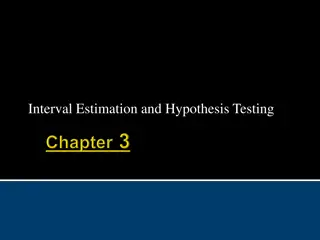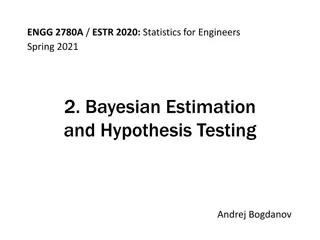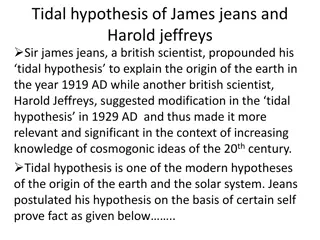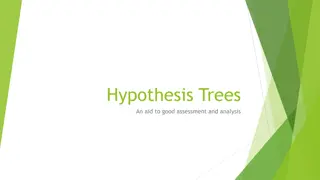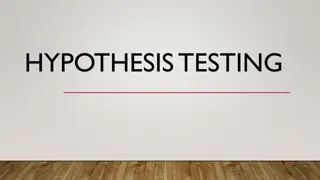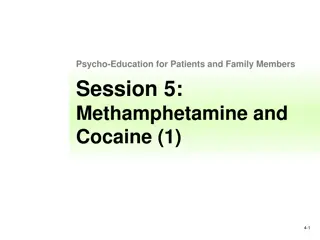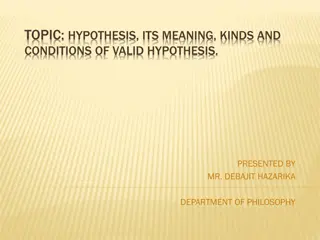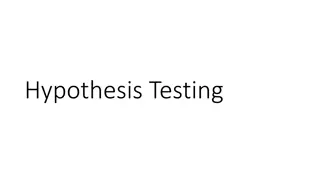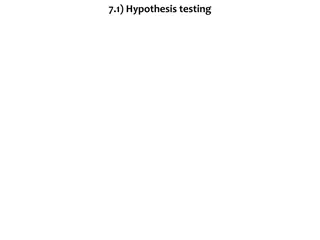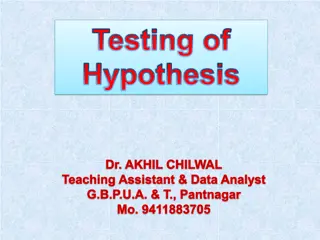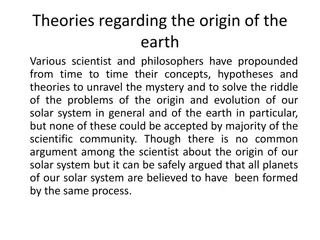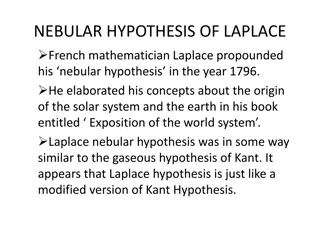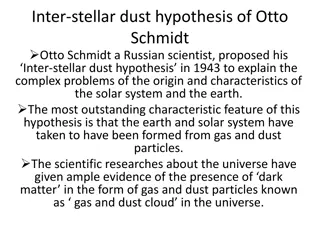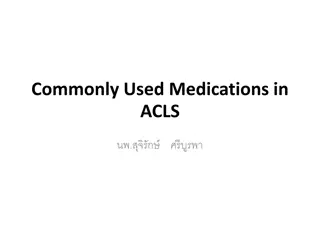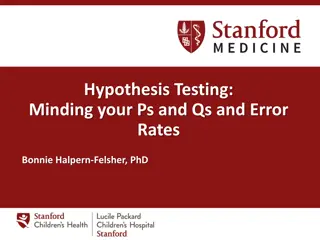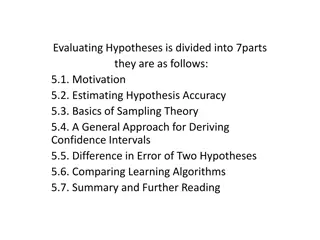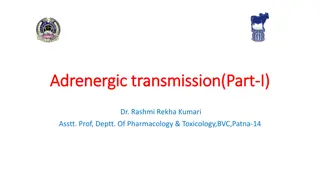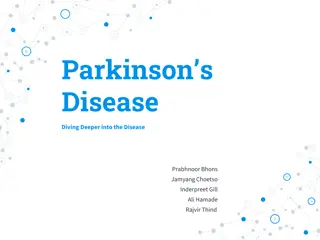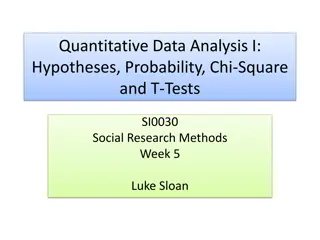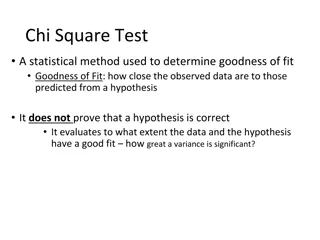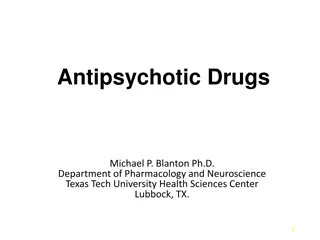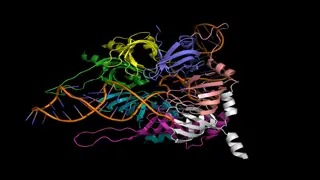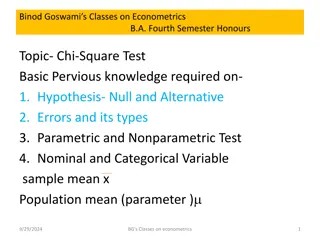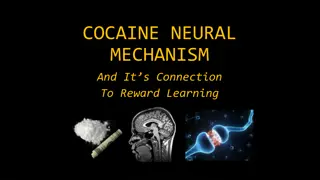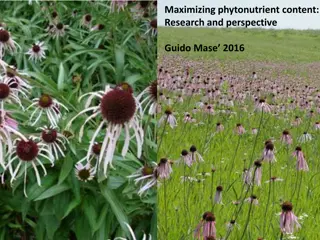Understanding Antipsychotic Drugs and Their Classification
Antipsychotic drugs, also known as neuroleptics, are essential in treating schizophrenia and other psychotic disorders. They work by targeting dopamine and serotonin receptors in the brain, managing symptoms like hallucinations and delusions. Learn about the dopamine-serotonin hypothesis of schizoph
9 views • 21 slides
Understanding Interval Estimation and Hypothesis Testing in Statistics
The concept of interval estimation and hypothesis testing in statistics involves techniques such as constructing interval estimators, performing hypothesis tests, determining critical values from t-distributions, and making probability statements. Assumptions must be met in linear regression models
0 views • 25 slides
Bayesian Estimation and Hypothesis Testing in Statistics for Engineers
In this course on Bayesian Estimation and Hypothesis Testing for Engineers, various concepts such as point estimation, conditional expectation, Maximum a posteriori estimator, hypothesis testing, and error analysis are covered. Topics include turning conditional PDF/PMF estimates into one number, es
1 views • 16 slides
The Tidal Hypothesis of James Jeans and Harold Jeffreys: Origin of the Earth
The Tidal Hypothesis proposed by British scientists James Jeans and Harold Jeffreys in the early 20th century suggested that the Earth and solar system were formed from the interaction of the Sun and an intruding star. Jeans postulated that massive gravitational forces from the intruding star caused
2 views • 5 slides
Understanding Hypothesis Trees for Effective Assessment and Analysis
Hypothesis trees offer a structured approach to analysis by identifying problems, potential causes, testing hypotheses, and reaching conclusions. They enhance evidence gathering and ensure the child's perspective is central in assessments. Utilizing stages like problem identification, cause analysis
1 views • 11 slides
Understanding Type I and Type II Errors in Hypothesis Testing
In statistics, Type I error is a false positive conclusion, while Type II error is a false negative conclusion. Type I error occurs when the null hypothesis is incorrectly rejected, leading to a conclusion that results are statistically significant when they are not. On the other hand, Type II error
0 views • 6 slides
Understanding the Effects of Methamphetamine and Cocaine
This session covers the differences between cocaine and methamphetamine, focusing on their effects on the brain, particularly the role of dopamine. It explains how dopamine influences pleasure, motivation, and various responses in the body. Imbalance in dopamine levels can lead to a range of symptom
0 views • 20 slides
Understanding Hypothesis: Meaning, Types, and Validity Conditions
A hypothesis is a provisional supposition used to explain a fact or phenomenon, serving as a starting point in investigations to establish causal connections. This article explores the meaning of hypothesis, different types, conditions for validity, and examples. Definitions by prominent philosopher
0 views • 22 slides
Understanding Hypothesis Testing and Null vs. Alternative Hypotheses
A hypothesis is a prediction about a study's outcome, guiding research direction. Stating hypotheses forces deep thinking and making specific predictions but may introduce bias. Null hypothesis (H0) states no effect, while alternative hypothesis (Ha) claims an effect in the population. Researchers e
0 views • 7 slides
Hypothesis Testing Examples and Scenarios
Explore various scenarios involving hypothesis testing, including coin bias, dice rolling, and election candidate support estimation. Learn to define test statistics, null and alternative hypotheses, select significance levels, and determine conditions for rejecting the null hypothesis based on samp
0 views • 9 slides
Understanding Hypothesis Testing in Statistical Analysis
Statistical analysis aims to make inferences about populations based on sample data. Hypothesis testing is a crucial aspect where decisions are made regarding accepting or rejecting specific values or parameters. Statistical and parametric hypotheses, null hypotheses, and decision problems are key c
1 views • 34 slides
Theories on the Origin of Earth and Solar System
Scientists and philosophers have proposed various theories regarding the origin of Earth and our solar system, with concepts ranging from evolutionary to catastrophic. The Dust gas cloud theory, Planetesimal hypothesis, Binary star hypothesis, and more have been suggested to explain how planets were
4 views • 7 slides
Laplace's Nebular Hypothesis: Origin of the Solar System
French mathematician Laplace proposed the nebular hypothesis in 1796, refining Kant's gaseous hypothesis. Laplace asserted a hot rotating gaseous nebula cooled gradually, contracting and increasing rotation speed. Eventually, centrifugal forces led to the formation of ring structures, contrasting wi
0 views • 6 slides
The Interstellar Dust Hypothesis of Otto Schmidt Explained
Russian scientist Otto Schmidt proposed the Interstellar Dust Hypothesis in 1943 to explain the origin of the solar system and Earth. According to this hypothesis, gas and dust particles from the universe formed our solar system. The dark matter in the form of gas and dust clouds played a crucial ro
3 views • 5 slides
Understanding the Effects of Methamphetamine and Cocaine
Explore the key differences between cocaine and methamphetamine, how dopamine plays a crucial role in the brain affecting movement, thinking, and pleasure responses. Learn about the effects of dopamine imbalance and the impact of stimulant drugs on dopamine levels over time. Understand the addiction
0 views • 20 slides
Commonly Used Medications in ACLS: Adenosine, Amiodarone, Atropine, Dopamine, Epinephrine
Adenosine is used for SVT, Amiodarone for VT/VF, Atropine for bradycardia, Dopamine for shock, and Epinephrine for cardiac arrest. Each medication has specific dosages and side effects. These drugs play crucial roles in advanced cardiac life support scenarios.
8 views • 16 slides
Understanding Hypothesis Testing in Statistics
Hypothesis testing is essential in scientific inquiry, involving the formulation of null and alternative hypotheses at a chosen level of significance. Statistical hypotheses focus on population characteristics and are tested on samples using probability concepts. The null hypothesis assumes no effec
0 views • 26 slides
Understanding Hypothesis Evaluation in Machine Learning
Evaluating hypotheses in machine learning is crucial for assessing accuracy and making informed decisions. This process involves estimating hypothesis accuracy, sampling theory basics, deriving confidence intervals, comparing learning algorithms, and more. Motivated by questions about accuracy estim
0 views • 26 slides
Understanding Adrenergic Transmission and Catecholamine Synthesis
Adrenergic transmission involves the release of neurotransmitters such as norepinephrine, dopamine, and epinephrine at synapses or neuroeffector junctions. These neurotransmitters, known as catecholamines, play crucial roles in transmitting impulses in the sympathetic nervous system and central nerv
0 views • 14 slides
Science Project - Investigating the Effects of Variables on Plant Growth
Conducting a science project to explore the impact of different variables on plant growth. The project involves formulating a hypothesis, conducting background research, testing the hypothesis, and analyzing the results to draw conclusions. Detailed information on the research process, hypothesis fo
0 views • 13 slides
Understanding Parkinson's Disease: Diving Deeper into the Neurodegenerative Disorder
Parkinson's disease is a neurodegenerative disorder that impacts dopamine levels in the brain. The history, epidemiology, causes, and pathophysiology of the disease are explored, shedding light on its significant impact on the nervous system. Genetic and environmental factors play a role in the deve
0 views • 25 slides
Understanding the Basic Science Hypothesis and Writing Techniques
Exploring the concept of the basic science hypothesis, its importance in research, and tips for effective hypothesis writing. The scientific method, historical perspectives from Karl Popper to Paul Feyerabend, and the role of serendipity in scientific discoveries are discussed.
0 views • 61 slides
Understanding Hypothesis Testing: Examples and Interpretation
This content covers various examples of hypothesis testing scenarios, including car drivers' preferences for turning directions, the effectiveness of a new drug compared to a standard treatment, and the probability of seeds germinating in a greenhouse. It explains how to formulate null and alternati
0 views • 11 slides
Understanding Hypotheses, Probability, and Statistical Tests in Social Research
This content delves into formulating hypotheses in social science, selecting statistical tests based on variables' measurement levels, understanding probability in statistical analysis, and distinguishing between null and alternative hypotheses. It emphasizes the research process involving hypothesi
5 views • 21 slides
Understanding Variables, Hypothesis, and Experimental Design
Variables play a crucial role in experiments, with the independent variable being the condition that is changed, and the dependent variable being the factor affected by the change. Control variables must remain constant. Hypothesis is an educated guess that can be tested. Explore the relationship be
0 views • 13 slides
Around the World in 80 Tosses: Introducing Hypothesis Tests
Engage students in a fun activity using an inflatable globe to introduce hypothesis testing concepts. Students make claims about Earth's surface cover, collect data by tossing the globe, and perform hypothesis tests based on the observations. Encourage critical thinking, statistical reasoning, and i
0 views • 6 slides
Understanding Efficient Markets Hypothesis in Corporate Finance
Explore the concepts of efficient markets hypothesis (EMH) and adaptive markets hypothesis (AMH) in corporate finance. EMH posits that all information is instantly reflected in stock prices, while AMH suggests a gradual process based on the number of analysts. Learn about different forms of market e
0 views • 33 slides
Understanding Chi-Square Test for Goodness of Fit
Chi-square test is a statistical method used to assess how well observed data match the predicted values from a hypothesis. It does not confirm the hypothesis but measures the extent of fit between data and the hypothesis. This test is crucial for determining the significance of differences between
0 views • 10 slides
Understanding Hypothesis Testing in Statistics
Explore the concept of hypothesis testing through an engaging scenario involving Edison light bulbs. Learn about factors influencing hypothesis testing such as variability, sample size, and sample mean. Discover the logic behind hypothesis testing using Jake's napkin dispensers example. Enhance your
0 views • 28 slides
Pharmacotherapy Overview of Parkinson's Disease and Related Disorders
Overview of pharmacological treatment options for Parkinson's disease and related conditions like choreatic dyskinesias, spastic disorders, and myasthenia gravis. Describes the degenerative process of Parkinson's disease, its symptoms, and the pharmacological interventions targeting dopamine deficit
0 views • 26 slides
Overview of Antipsychotic Drugs and Treatment for Psychotic Disorders
Antipsychotic drugs play a vital role in managing psychotic disorders by targeting dopamine and serotonin receptors. This overview covers the mechanism of action, classification (typical vs. atypical), side effects, and therapeutic efficacy of antipsychotic medications. It also delves into the mood-
0 views • 31 slides
Understanding Hypothesis Testing in Statistics
Hypothesis testing is a fundamental concept in statistics that involves testing statements about population parameters. This content covers the basics of hypothesis testing, including types of hypotheses, examples, and the procedure involved in statistical hypothesis testing. It also explores the im
0 views • 23 slides
Understanding Hypothesis Testing in Statistics
This content discusses the fundamentals of hypothesis testing based on a single sample in statistics. It covers the assumptions for inference, the parts of a hypothesis test, statistical hypotheses, and provides examples of hypothesis tests and significance tests in practical scenarios. The importan
0 views • 69 slides
Understanding Splice Sites and Splicing Elements in the Inhibitory Dopamine Receptor Gene (D2)
In this project, the focus is on identifying splice sites relevant to the inhibitory dopamine receptor gene (D2). The problem involves finding splicing elements within a specific range of known splice sites in the gene. The data provided includes the D2 gene entry in FASTA format, a database of spli
0 views • 13 slides
Understanding the Effects of Methamphetamine and Cocaine
Explore the key differences between cocaine and methamphetamine, the role of dopamine in the brain, the effects of dopamine imbalance, and the impact of stimulant drugs like shabu/cocaine on dopamine levels over time. Learn about the craving, use, depression, and addiction cycle associated with thes
0 views • 20 slides
Understanding Hypothesis Testing and Types of Errors in Econometrics
Hypothesis testing is vital in econometrics to evaluate statements about population parameters. The null hypothesis assumes no difference, while the alternative hypothesis offers a different perspective. Different types of errors—such as Type I and Type II errors—can occur during hypothesis test
1 views • 11 slides
Understanding Cocaine's Neural Mechanism and Reward Learning Circuit
Cocaine affects the brain's reward circuit by blocking dopamine transporters, leading users to associate the drug with a rewarding feeling. Prolonged use can result in internalization of dopamine receptors. By hijacking reward-learning mechanisms, cocaine becomes one of the most harmful and addictiv
0 views • 13 slides
Understanding Hypothesis Testing in Statistics
This content explores the concept of hypothesis testing in statistics, covering the procedures, general research questions, examples, and hypothesis design. It explains the formulation of hypotheses, decision criteria, significance levels, and the importance of testing population parameters. Various
1 views • 97 slides
Understanding Schizophrenia: Insights from Carlsson et al.'s 2000 Study
Carlsson et al.'s 2000 study on schizophrenia explores the dopamine hypothesis, highlighting the interplay of neurotransmitters like glutamate, serotonin, and GABA. They suggest future drug treatments for schizophrenia, emphasizing the need to consider neurotransmitter interactions beyond dopamine.
0 views • 17 slides
Understanding Plant Chemistry and Phytonutrients: Insights from Research
Exploring the diverse world of plant chemistry, this content delves into primary and secondary metabolites, highlighting the significance of phytonutrients in maximizing nutritional content. Various hypotheses such as the Insecticide Hypothesis and Co-evolution Hypothesis are discussed, shedding lig
0 views • 61 slides

